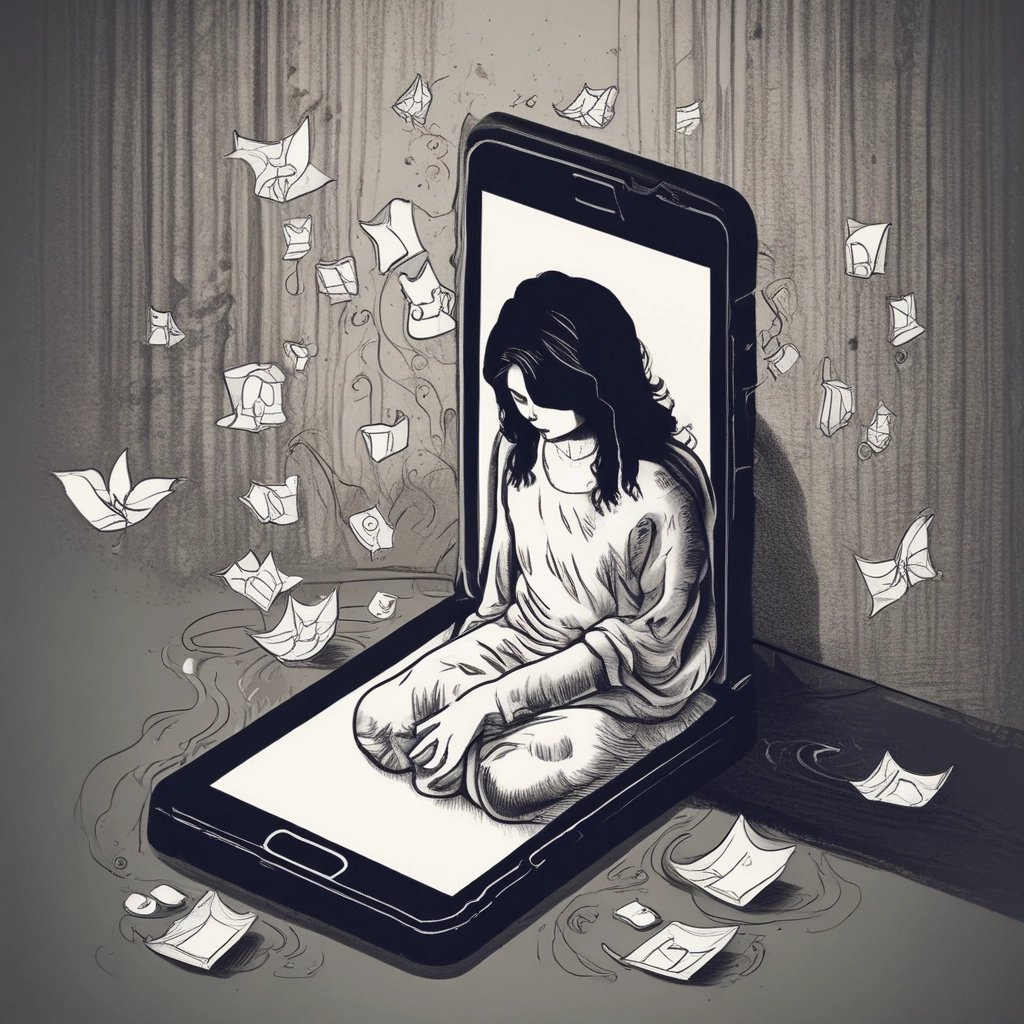Essays and Conversations on Community & Belonging
The Grail in the Glass: Searching for Meaning Online
A Jungian analysis of modern spiritual burnout, diagnosing our social media addiction as a misguided quest for meaning and revealing how our deepest cravings point the way back to the authentic Self.
DIGITAL LIFE & THE ATTENTION ECONOMYSHADOW AND PERSONATHE ARCHITECTURE OF THE SELFTHE VOIDADDICTION & DOPAMINEPERFORMANCE V AUTHENTICITY
Alex Pilkington
10/13/20256 min read


It's been about a month since I last posted to Facebook and about 2 weeks since I last posted to Instagram... and in this moment I want nothing more than to reactivate both and create a provocative post to receive cheap attention and feel less lonely. So here's this instead.
I just dumped the title and description text into AI image generator... then selected the best of the 2 versions created.
The Soul in the Machine
It begins not as a crisis, but as a quiet hum of dissatisfaction. A pervasive energy drain, a subtle apathy that settles over life like a low-grade fever, a nagging sense that the world, once vibrant with purpose, has become a flat, gray screen. This is spiritual malaise: a burnout of the soul that leaves us feeling profoundly disconnected, questioning the very meaning of our own lives. We have all felt it, this modern ache of the untethered individual.
In my own attempts to diagnose this condition, I’ve found a compelling framework in the work of Carl Jung. His philosophy offers a profound lens through which to understand a uniquely modern malady: our collective addiction to the digital world. From a Jungian perspective, our compulsive relationship with social media is not a simple behavioral problem. The endless doom scroll, the toxic online exchange, and the desperate performance of the curated profile is a symptom of a deeper spiritual hunger, a misguided and desperate search for connection, meaning, and the integrated Self.
The Digital Abyss
To understand why this search so often leads us astray, we must first recognize the chemical affects of this social drug. Platforms were not designed not to nourish us, but to capture our attention above anything else. The tiny, thrilling ping of a notification, the validation of a ‘like,’ delivers a fleeting hit of dopamine, a chemical reward that keeps us tapping, swiping, and coming back for more. But it is candy, not sustenance. This neurological sugar rush is a hollow substitute for the deep, resonant warmth of oxytocin, the bonding hormone released in a true embrace, a moment of shared vulnerability, or a conversation that stretches late into the night. We have been expertly manipulated into mistaking the search for validation for the much deeper human need for connection. The machine offers a phantom limb for a soul that has lost its real community.
This is what makes the addiction a form of inverted spirituality. Jung argued that our deepest addictions are often a "low-level" search for union with the divine, a thirst for wholeness gone wrong. Consider the historical quest for the Holy Grail, the archetypal journey for meaning in the Western imagination. It was never just a hunt for an object; it was a perilous spiritual discipline. To even be considered for the quest, a knight had to cultivate virtue, face his deepest fears, and purify his own heart. The journey was a crucible designed to burn away the inessential, a transformative path toward perfection and communion with the divine. Its very difficulty was the source of its meaning.
Now, look at its modern, distorted reflection: the endless scroll. Is it not also a quest, a search for that one thing that will finally satisfy? But this is a quest stripped of all virtue, all sacrifice, and all meaning. It requires nothing of us but a passive thumb and our vacant attention. The algorithm becomes a false prophet, promising that the next video, the next shocking opinion, the next curated image will bring a sense of fulfillment or ultimate knowledge. But it is a promise designed to be broken. The journey offers no transformation, only a frictionless slide into digital oblivion. The sacred road has been replaced by an infinite feed, and the horizon never gets closer. In this, we are seeking the Grail in a glass screen, a sacred experience in a profane space.
This inverted quest has replaced the very real structures that once grounded us. Humanity once found meaning in the tangible world: in community rituals around a fire, in the shared stories that gave life context, in a living relationship with the cycles of nature. We have traded these sacred, embodied experiences for the curated, disembodied, and relentlessly performative reality of social media, severing the spiritual threads that once held us fast to the earth and to each other.
The screen’s most insidious function, then, is as an anesthetic. Mindless scrolling is a powerful tool for avoiding difficult emotions, inner turmoil, and the essential work of self-reflection, what Jung might call confronting one’s own Shadow. We scroll to evade boredom, to numb anxiety, to sidestep the profound questions our own silence might ask of us. This avoidance creates a cavernous "empathy gap," disconnecting us not only from the nuanced reality of others but, most tragically, from the deepest and most challenging parts of ourselves.
Back to the Self
The path out of this digital abyss, however, begins not with rage against the machine, but with a quiet turn inward. The first step is to consciously disconnect and embrace the silence. This is more than simply muting notifications; it is the spiritual discipline of creating an inner space free from the constant, frantic noise of the feed. It is in this intentional silence that we can finally begin to hear the faint whispers of our own intuition, the "spirit of the depths" that the digital cacophony so effectively drowns out.
From that silence, the next step is to seek out the tangible. We must actively pursue embodied, real-world experiences to find our ‘sacred circle’ once more. This can be as simple as a walk in the woods without a phone, feeling the cool bark of a tree, or sitting by a river and watching the light play on the water. It is about re-engaging the senses with the natural world. And it is about finding our tribe, a space where "collective healing" can happen, places where we can show up as we are, without a filter or a carefully constructed brand.
Herein lies a profound paradox, central to Jung’s thought: the darkness holds the key to the light. The gnawing emptiness and craving felt during addiction are not merely pains to be avoided. They are a compass. That desperate hunger points directly to what the soul is starved of whether that is authentic connection, quiet contemplation, or a sense of real purpose. The digital "hell" we create for ourselves, the frantic searching and the inevitable hollowness, is the very experience that can initiate the journey back to depth.
The craving always reveals the cure.
This journey culminates in the courage to be real and authentic. The online world thrives on a culture of curated performance for an audience, a relentless and continuous posturing of what we think is the desirable version of ourselves. The only true antidote is authentic vulnerability. It is the practice of sharing our flaws, fears, and all—in safe, real-life relationships. It is in these moments of genuine seeing and being seen that we restore the authentic connection that social media mimics but can never, ever replace.
The Struggle for the True Self
Ultimately, the journey out of the digital abyss is a constant and conscious choice. The siren call of the screen, with its tempting promise of easy oblivion, never truly disappears. We are like Ulysses, who heard a song that promised ultimate knowledge but delivered only ruin. He survived not through willpower alone, but by binding himself to the mast of his ship—a real-world vessel with a real-world destination—and trusting his crew to see him through. His crew could see him, not the mesmerized victim the Sirens saw.
This is our task: to bind ourselves to a community of brothers and sisters who see past our digital shadow to the person navigating the storm. For the screen has become a dark mirror, reflecting our compulsions so perfectly that the shadow self it shows us begins to feel more real than our true Self. Our addiction is the soul’s cry for this genuine connection, a search for wholeness in a machine that only knows how to fracture it.
I feel the pull of that siren song daily. The temptation to abandon the hard work of reflection is immense. But perhaps the struggle is the point. It is a constant, necessary lament that forces us to choose: the soul over the machine, depth over distraction, and the arduous quest for our true Self over the endless, empty feed.



